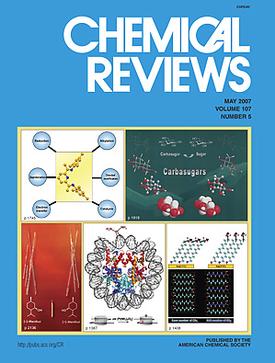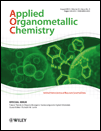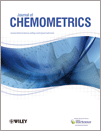
The Journal of Organic Chemistry, colloquially known as JOC, is a peer-reviewed scientific journal for original contributions of fundamental research in all branches of theory and practice in organic and bioorganic chemistry. It is published by the publishing arm of the American Chemical Society, with 24 issues per year. According to the Journal Citation Reports, the journal had a 2023 impact factor of 3.3 and it is the journal that received the most cites in the field of organic chemistry. According to Web of Knowledge, eleven papers from the journal have received more than 1,000 citations, with the most cited paper having received 7,967 citations. The current editor-in-chief is Scott J. Miller from Yale University.

Chemical Reviews is peer-reviewed scientific journal published twice per month by the American Chemical Society. It publishes review articles on all aspects of chemistry. It was established in 1924 by William Albert Noyes. The editor-in-chief is Sharon Hammes-Schiffer.

Accounts of Chemical Research is a semi-monthly peer-reviewed scientific journal published by the American Chemical Society containing overviews of basic research and applications in chemistry and biochemistry. It was established in 1968 and the editor-in-chief is Cynthia J. Burrows.

Chemical Society Reviews is a biweekly peer-reviewed scientific journal published by the Royal Society of Chemistry, for review articles on topics of current interest in chemistry. Its predecessors were Quarterly Reviews, Chemical Society (1947–1971) and Royal Institute of Chemistry, Reviews (1968–1971); it maintained its current title since 1972. According to the Journal Citation Reports, the journal has a 2021 impact factor of 60.615. The current editor-in-chief is Jennifer Love.

Organic & Biomolecular Chemistry is a weekly peer-reviewed scientific journal covering all aspects of organic chemistry, including organic aspects of chemical biology, medicinal chemistry, natural product chemistry, supramolecular chemistry, macromolecular chemistry, theoretical chemistry, and catalysis. It is published by the Royal Society of Chemistry. Its predecessor journals were Perkin Transactions I and Perkin Transactions II. The Executive Editor is Richard Kelly.

Analytical Chemistry is a biweekly peer-reviewed scientific journal published since 1929 by the American Chemical Society. Articles address general principles of chemical measurement science and novel analytical methodologies. Topics commonly include chemical reactions and selectivity, chemometrics and data processing, electrochemistry, elemental and molecular characterization, imaging, instrumentation, mass spectrometry, microscale and nanoscale systems, -omics, sensing, separations, spectroscopy, and surface analysis. It is abstracted and indexed in Chemical Abstracts Service, CAB International, EBSCOhost, ProQuest, PubMed, Scopus, and the Science Citation Index Expanded. According to the Journal Citation Reports, it has a 2022 impact factor of 7.4. The editor-in-chief is Jonathan V. Sweedler.

Inorganic Chemistry is a biweekly peer-reviewed scientific journal published by the American Chemical Society since 1962. It covers research in all areas of inorganic chemistry.
The Science Citation Index Expanded is a citation index originally produced by the Institute for Scientific Information (ISI) and created by Eugene Garfield.

Soft Matter is a peer-reviewed scientific journal covering the science of soft matter. It is published by the Royal Society of Chemistry and the editor-in-chief is Darrin Pochan.
Natural Product Reports is a monthly peer-reviewed scientific journal published by the Royal Society of Chemistry. It publishes reviews commissioned by the editorial board on all areas of natural products research. The editors-in-chief is Tobias Gulder.

Applied Organometallic Chemistry is a monthly peer-reviewed scientific journal published since 1987 by John Wiley & Sons. The editor-in-chief is Cornelis J. Elsevier.

The Journal of Chemometrics is a monthly peer-reviewed scientific journal published since 1987 by John Wiley & Sons. It publishes original scientific papers, reviews, and short communications on fundamental and applied aspects of chemometrics. The current editor-in-chief is Age K. Smilde.
Robert George Bergman is an American chemist. He is Professor of the Graduate School and Gerald E. K. Branch Distinguished Professor Emeritus at the University of California, Berkeley.

Chemistry of Materials is a peer-reviewed scientific journal, published since 1989 by the American Chemical Society. It was founded by Leonard V. Interrante, who was the Editor-in-Chief until 2013. Jillian M. Buriak took over as Editor-in-Chief in January 2014. She was followed by Sara E. Skrabalak, who assumed the position of Editor-in-Chief in November 2020.
The Journal of Agricultural and Food Chemistry is a weekly peer-reviewed scientific journal established in 1953 by the American Chemical Society. Since 2015, Thomas Hofmann has been the editor-in-chief.
The Journal of Physical Chemistry Letters is a peer-reviewed scientific journal published by the American Chemical Society. The editor-in-chief is Gregory D. Scholes at Princeton University. The Journal of Physical Chemistry Letters covers research on all aspects of physical chemistry. George C. Schatz was editor-in-chief from 2010 to 2019.

The Journal of Cheminformatics is a peer-reviewed open access scientific journal that covers cheminformatics and molecular modelling. It was established in 2009 with David Wild and Christoph Steinbeck as founding editors-in-chief, and was originally published by Chemistry Central. At the end of 2015, the Chemistry Central brand was retired and its titles, including Journal of Cheminformatics, were merged with the SpringerOpen portfolio of open access journals.
The Journal of Photochemistry and Photobiology is a series of peer-reviewed scientific journals covering the fields of photochemistry and photobiology, published by Elsevier. It was originally established in 1972, and split into Journal of Photochemistry and Photobiology A: Chemistry and Journal of Photochemistry and Photobiology B: Biology in 1987. A third title; Journal of Photochemistry and Photobiology C: Photochemistry Reviews, was established in 2000 and is the official journal of the Japanese Photochemistry Association.
Jayaraman Chandrasekhar is an Indian computational chemist and a former professor at the department of organic chemistry of the Indian Institute of Science. He is known for his studies on the structure and bonding of organic molecules and is an elected fellow of Indian National Science Academy, and the Indian Academy of Sciences The Council of Scientific and Industrial Research, the apex agency of the Government of India for scientific research, awarded him the Shanti Swarup Bhatnagar Prize for Science and Technology, one of the highest Indian science awards, in 1995, for his contributions to chemical sciences.

Paul James Chirik is an American chemist known for his work in sustainable chemistry using Earth-abundant metals like iron, cobalt, and nickel to surpass the performance of more exotic elements traditionally used in catalysis. He is the Edwards S. Sanford Professor of Chemistry and chair of the chemistry department at Princeton University.













